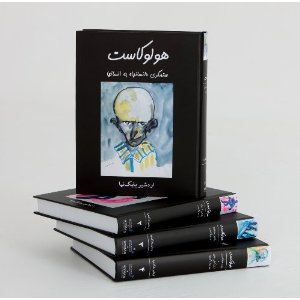On October 14, I was privileged to be a student delegate at 30 Years After’s 3rd Biennial Conference. 30 Years After is the civic and political voice of America’s Iranian Jews, the first and only organization of its kind. The group seeks to educate, inspire, and mobilize the Iranian Jewish community through civic action conferences, voter registration drives, lectures and seminars on issues facing the Persian community, and through its Iranian-Jewish oral history preservation project. As a student of history, I was particularly impacted by one speaker at the conference — Dr. Ari Babaknia.
 Babaknia, now 65 years old, came to the United States in 1974 (pre-Iranian Revolution, unlike most Iranian-Jewish immigrants) as a young man after completing his medical degree in Iran for a fellowship in women’s health and fertility at Johns Hopkins University. His interest in Holocaust history began in the 1990s, but as he explained in his presentation at 30 Years After, he had tremendous difficulty finding any literature on the topic written in his native tongue of Farsi. He explained that the Holocaust was not mentioned in Iran’s primary or secondary school curricula, and even as a Jew, he “knew only one name: Hitler.”
Babaknia, now 65 years old, came to the United States in 1974 (pre-Iranian Revolution, unlike most Iranian-Jewish immigrants) as a young man after completing his medical degree in Iran for a fellowship in women’s health and fertility at Johns Hopkins University. His interest in Holocaust history began in the 1990s, but as he explained in his presentation at 30 Years After, he had tremendous difficulty finding any literature on the topic written in his native tongue of Farsi. He explained that the Holocaust was not mentioned in Iran’s primary or secondary school curricula, and even as a Jew, he “knew only one name: Hitler.”
He then recounted an exchange with an Iranian youth in order to highlight the continued ignorance about the topic in the Iranian community. Several years ago, Babaknia hosted an Iranian medical student, the son of one of his friends from Iran. One afternoon, while he was spending time with Babaknia in his study, the visitor scanned Babaknia’s bookshelves. A particular set of book spines caught his attention, and he was prompted to ask, “Dr. B, what is ‘Holocaust?’ Is it a medical term? What is it? I haven’t heard of the word.”
Babaknia told the audience that it was this moment that reaffirmed for him the need to pen a Holocaust history book in Farsi. In other words, he knew that he had to take it upon himself to plug this gaping historiographical hole.
Babaknia took time off from his regular job and began his research. He set out to answer the following: How? How did millions stand idly by as Hitler exterminated millions more? To what extent did the rest of the world know what was going on? As he explains it, one year of research turned into two years, which turned into three years, and now, finally, after 15 years of research, Babaknia has produced four volumes. They are entitled Man’s Inhumanity to Man, America’s Response to the Holocaust, End of the Holocaust and Liberation of the Nazi camps, and The Genocides of the Last 100 Years.
Babaknia’s personal investment in this project is demonstrated not only by the time he has spent on it, but also by the fact that he has invested about $80,000 from his own family foundation, Memorah. Perhaps even more notably, because he did not know how to type in Farsi, he handwrote all four volumes from cover to cover.
This self-published one-man pursuit is finally gaining the recognition that it deserves, at an accelerated pace. First, the book was presented at the 30 Years After 3rd Biennial Conference. Furthermore, The Simon Wiesenthal Center in Los Angeles and the David S. Wyman Institute for Holocaust Studies in Washington D.C. are slated to host book launches for Babaknia.
The importance of Babaknia’s works should not be underestimated. Knowledge of the Holocaust in Iran today is still limited, which is to be expected of a country whose president, Mahmoud Ahmadinejad, is the reigning international figurehead for Holocaust denial. There are 110 million people around the world who speak Farsi. They now have a resource that will counter their politicians’ denial of genocide.
Once he recovers his publishing costs, Babaknia hopes to make the volumes available for free online within the borders of Iran. “It is not enough to sell [these volumes]. The power and reach of the Internet is where the real impact of [these volumes] will be,” says Babaknia. “I want the entire young Persian-speaking world who have access to the Internet to have the ability to download [them], read [them], and research [them]…Because, after all, forgetting the Holocaust is repeating the Holocaust.”
The volumes are available through Amazon and the websites HolocaustinFarsi.com and Memorah.com. I have already purchased copies for my grandparents, and I feel as though I am now an active participant in “bearing witness” and extending that honor and responsibility to the non-Ashkenazi Jewish community, which has been split off from its Ashkenazi counterpart by the political wedge of Holocaust denial and inaccessibility.

